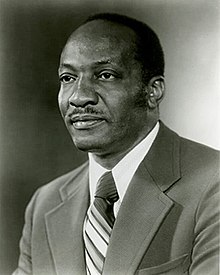W. Sterling Cary | |
|---|---|
 Cary in the 1970s | |
| President of the National Council of Churches | |
| In office December 7, 1972 – October 11, 1975 | |
| Preceded by | Cynthia Clark Wedel |
| Succeeded by | William Phelps Thompson |
| Personal details | |
| Born | William Sterling Cary August 10, 1927 Plainfield, New Jersey, U.S. |
| Died | November 14, 2021 (aged 94) Flossmoor, Illinois, U.S. |
| Education | Morehouse College (BA) Union Theological Seminary (BD) |
William Sterling Cary (August 10, 1927 – November 14, 2021) was an American Christian minister. From 1972 to 1975, he was the first Black president of the National Council of Churches (NCC) in its history.
Born and raised in Plainfield, New Jersey, Cary earned a Bachelor of Arts degree in 1949 from Morehouse College, where he served as student body president. He was ordained a Baptist minister and studied at Union Theological Seminary, receiving a Bachelor of Divinity degree in 1952. Unable to find a position in a Baptist church, he became a pastor at a Presbyterian church from 1952 to 1955 in Youngstown, Ohio, and then at an experimental interdenominational church in Brooklyn. Cary changed his denominational affiliation to the United Church of Christ (UCC) in 1958. He became increasingly active in the Black liberation theology movement in the 1960s, advocating for racial justice and equality within the UCC and on a broader scale.
He was elected administrator of the New York Metropolitan Association of the UCC in 1968, and four years later he was unanimously elected to a three-year term as president of the National Council of Churches. Cary was a harsh critic of U.S. President Richard Nixon's budget cuts to affordable housing and anti-poverty measures. Though he disagreed with Nixon's successor, Gerald Ford, on issues related to the Vietnam War, they rekindled a long-neglected relationship between the NCC and the White House, and Ford later appointed Cary to an advisory committee that oversaw the resettlement of South Asian refugees in the United States. After Cary's presidency ended, he continued in his role as the executive minister of the Illinois conference of the UCC until his retirement in 1994.
